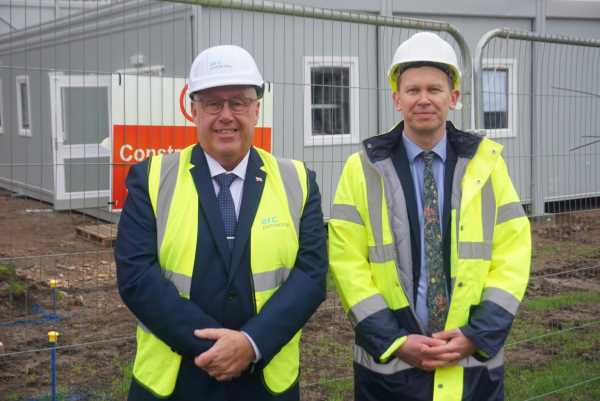Supervising Social Workers
A Day In The Life Of...
A Supervising Social Worker (Fostering)
I’m Sarah, and I’m a Social Worker within a Fostering Team. I qualified 4 years ago, and after completing a year in child protection I chose to move into fostering as I enjoy longer term work with families and find being able to support those who make a real difference to children, every hour of every day, really rewarding. I work full-time, there are 8 people in my team, and we’re based in Chesterfield, supporting foster carers and their families across the North of Derbyshire.
My daily routine
An average day for me will start with a statutory visit to a foster carer in their home. Often their foster children will be present as I tend to visit carers with preschool children during school time. These visits are an opportunity to supervise and support the family to ensure they are operating in line with fostering standards and providing a good level of care for the children. It is an opportunity to praise carers for their hard work but also challenge any poor practice or make suggestions about ways they could improve their care.
I will then tend to head into the office where I can check and respond to my messages and emails. These may be from foster carers, social workers or other professionals and a typical week will see over 100 needing to be dealt with and recorded. I will also need to write up all my visit notes and follow up on any agreed actions. In a typical week I would think I am office based for around 50% of the time. I often end my day with another visit – this time to a family who care for school age children so I am able to see the children after they have finished school.
As a supervising Social Worker we attend Looked after Childrens review meetings, placement planning meetings, fostering panel, matching matrix meetings – where we match children with prospective adopters – and annual reviews for foster carers. Meetings usually require reports to be completed so this is another aspect of my role. Other aspects of my role include delivering training to foster carers and running support and development groups.
At least once a fortnight I will be on team duty. This means I am responsible for dealing with any urgent problems which the team becomes aware of, if the allocated worker is not available. This may be an allegation against a foster carer or a child going missing. On these days if new placements are required for children coming into care I am required to consider the carers who have vacancies and match the children with the most suitable carers. These days can be quite hectic but sometimes rather uneventful.
Working in a fostering team means I am able to interact with a huge range of people and no day is ever dull. I spend a lot of time completing direct work with foster carers and their families and this means the children they look after also. Seeing these children either be supported to move back home to their family or onto an adoptive placement is particularly rewarding and sharing in the foster carer’s achievements is always a joy.
What would you say to someone considering this type of social work?
Fostering has its challenges, and it sometimes feels like as a supervising social worker you are always in the middle and trying to smooth relationships between foster carers, children and front line social workers. There are elements which are heart-breaking, for example, when a placement breaks down, but the other side to that is seeing so many children safe, settled and well cared for, and knowing that by supporting foster carers I have played a part in that. The role also allows you to complete long term work and make a real difference to lots of children through supporting foster carers to develop their skills, knowledge and care.
Get In Touch
General Enquiries
For general Teaching Partnership enquiries, please email the Project Manager for the D2N2 Teaching Partnership, Catherine Williams catherine.williams@nottscc.gov.uk
News & Events
Having an effective and vibrant partnership depends on everyone taking part – it’s about communication, about sharing, and about YOU! We’re really keen to get as many people as possible involved in our work, to share what they’ve learned, what they’re doing, and what they think
So, here’s your chance to tell us about:
- a new piece of research you’ve discovered
- a new project that you’re working on
- some new training that you’ve undertaken
- a conference you’ve heard about, or attended
- anything else that your social work colleagues, or students, might be interested in.
- Simply drop an email to cath.williams@nottingham.ac.uk, including “T.P.” in your email title.
If you have a query about any of our events, you can email:
cath.williams@nottingham.ac.uk
Practice Education
We have eight Practice Educator Leads, who you can contact if you want to know more about practice education – they are based within each of our employer organisations, as detailed below:
-
Derby City Council
Alma.Repesa@derby.gov.uk (Childrens)
Sue.Williams@derby.gov.uk (Adults) -
Derbyshire County Council
Fiona.Musselwhite@derbyshire.gov.uk -
Nottingham City Council
Alison.Rawlins@nottinghamcity.gov.uk -
Nottinghamshire County Council
Sara-eden.Ludwell@nottscc.gov.uk
Suzanne.Kerwin@nottscc.gov.uk -
Framework Housing Assoc.
Gillian.Ashley@frameworkHA.org -
NHS Healthcare Trust
james.liddement@nottshc.nhs.uk
Feedback
We are always looking to improve our services and we would love to hear your thoughts and bright ideas to help us develop and deliver a better, more valuable experience.
Please send your thoughts to catherine.williams@nottscc.gov.uk












Follow Us
Make sure that you dont miss a thing by following us on social media: